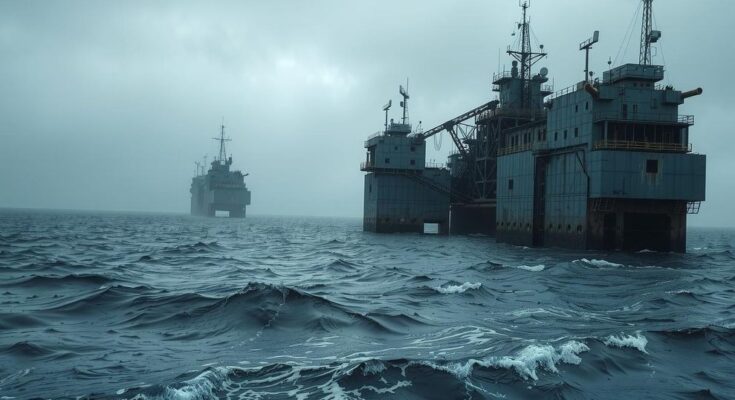Thirty migrants are stranded on an offshore platform in the Mediterranean, suffering from harsh conditions without food. Humanitarian groups have demanded intervention from Italian and Maltese authorities, citing international law protecting the rights of the migrants. Concerns over potential rights violations related to the ownership of the platform have also been raised.
A group of 30 migrants is currently stranded on an offshore platform in the Mediterranean Sea, east of Tunisia, facing dire conditions and lacking food for several days. The emergency hotline service, Alarm Phone, reports that the migrants’ health is deteriorating rapidly. The platform, situated approximately 75 miles off the Tunisian coast, is deemed inadequate for providing the necessary care.
The humanitarian organization Sea-Watch, which recently conducted a reconnaissance visit, noted that the migrants initially arrived on an inflatable boat, which was later found tethered to the structure. Tragically, one individual has reportedly died as a result of the extreme conditions, while others are enduring severe hunger and exhaustion.
Aid organizations are urging Italian and Maltese authorities to take action, declaring that the migrants are within international waters, which falls under both nations’ search and rescue operations. Sea-Watch emphasized their position with the statement, “They have the right to be transferred to a safe port.”
Human rights advocates have raised concerns regarding the potential complicity of Shell, the platform’s owner, and Amilcar Petroleum Operations, the managing entity, in possible rights violations should the migrants be forcibly sent back to Libya or Tunisia. Under international law, it is prohibited to return individuals to places where they might face persecution or harm.
In summary, thirty migrants remain stranded on an offshore platform in the Mediterranean amidst worsening conditions. With calls for intervention from aid organizations and human rights groups, the situation highlights critical humanitarian challenges and international law obligations regarding the treatment of individuals in distress at sea. The urgent need for a safe transfer to a port continues to escalate as health conditions deteriorate.
Original Source: libyaobserver.ly




